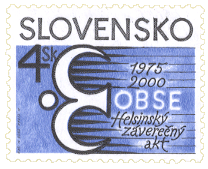The 35 signatures of the heads of state Under the ceremonial act in Helsinki, signed on the 1st August 1975, was the final conclusion of almost 3 years of negotiations. These negotiations have resulted in creation of the largest regional grouping in the world ever - the Organization for Security and Cooperation in Europe (OSCE). Today, the OSCE has 55 member states and it extends from the Canadian city Vancouver in the West up on the Russian Vladivostok in the Far East.
The focal point of the Helsinki act were the 3 groups of recommendations, which have entered into the history records as "pools of recommendations". The lst pool has been focused on the political-military aspect of security, the 2nd pool was focused on economic cooperation and the science and technology in the area of environment. But the most important pool for the citizens of those countries, who have lived for long decades under the communist totalitarian regime behind the "Iron Courtain" was the 3rd pool of recommandations, whose part was the upkeep of the human rights and liberaties, among others e.g. the liberty of opinion, conscience and belief. By signing of the Helsinki Act the representatives of the totalitarian regime have undertaken to maintain these liberties, which have decomposed their governing system. The ongoing suppression of these liberties and the quick economic decay have lead to the collapse of Communism, which occured in the late 80-ties and was accomplished by the fall of the Berlin Wall. At present the OSCE operates under different conditions, but its orientation remains unchanged. It looks after strengthening of the democratic values, it supports development of a new civil society based on the rule of law and it endeavors to prevent any local conflicts, to restore peace and stability throughout the Europe - the OSCE's operations area.
Dr. Peter Osuský
|

